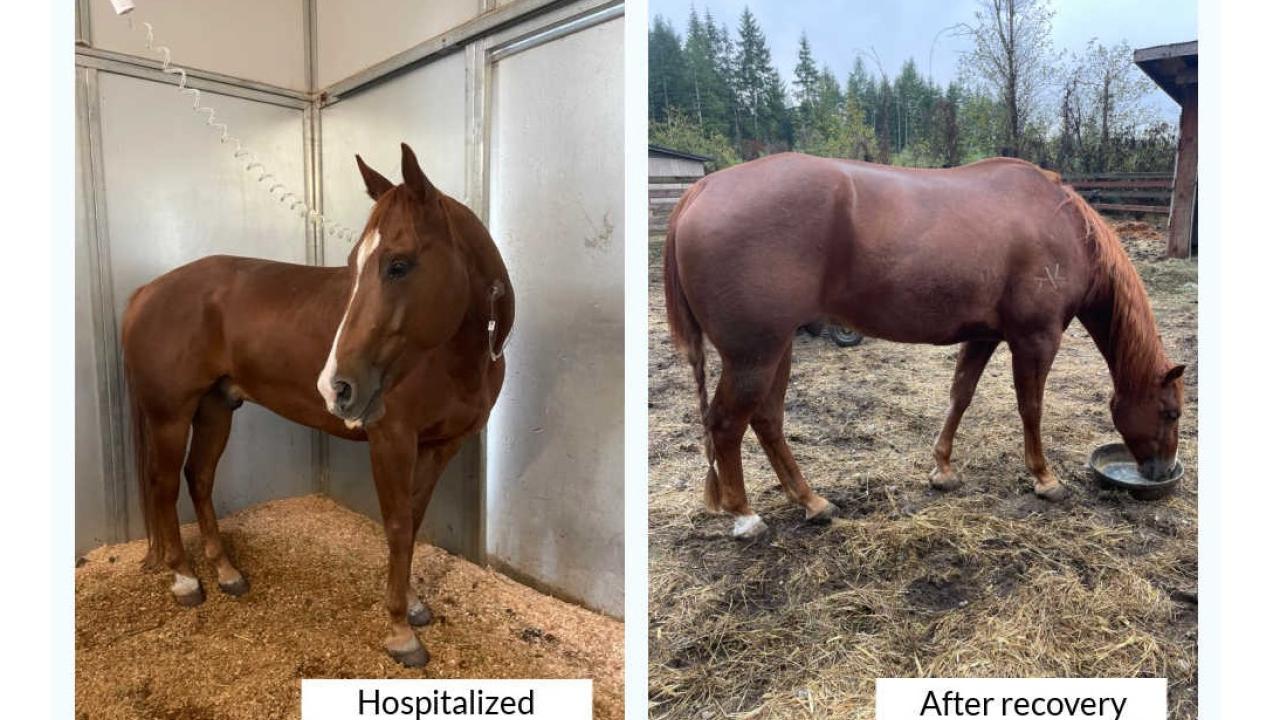
How genetic testing for MYHM helped Legend, a six year old American Quarter Horse
Legend, a 6-year-old American Quarter Horse, was showing signs of lethargy, loss of appetite, fever, dark urine, edema and muscle loss in the hindquarters. Soon after noticing a change in her horse, the concerned owner, Karissa Waber, decided to take him to her veterinarian for care. Legend was hospitalized for 8 days, but despite this care, his condition continued to worsen. In only a few days he developed colitis and signs of kidney failure. Nonetheless, Karissa’s veterinarian, Dr. Mem Dailey, was not ready to give up on Legend and started him on steroid treatments. Two days after treatment started, Legend began showing some improvement. His fever was gone, the colitis had subsided, and his appetite was starting to return.
I saw glimmers of hope and requested we keep trying the steroid treatment.” Said Karissa. “Dr Dailey was cautiously optimistic as was I. We continued a month-long tapered dose of prednisone. Dr. Dailey repeated his bloodwork 4 weeks later. We were both ecstatic that all of his numbers were in the normal range. He was truly a miracle! He started gaining weight and his muscles on his topline were slowly starting to return.”
While Legend was being treated, Karissa began reading all she could about muscle atrophy and came across videos and information on myosin-heavy chain myopathy (MYHM) shared by the UC Davis VGL. This information was developed and prepared in collaboration with Drs. Finno and Valberg, the researchers who identified the version of the Myosin Heavy Chain 1 (MYH1) gene, denoted as My, that increases susceptibility for two muscle diseases (immune-mediated myositis (IMM) and non-exertional rhabdomyolysis). After reading this material, Karissa and Dr. Dailey decided to have Legend tested and his results showed that he had two copies of the My allele. Homozygotes, or horses with two copies of My, have been documented in several studies to have a more severe form of disease compared to horses with only one copy of My.
IMM is typically characterized by loss of appetite, stiffness, weakness, and rapid muscle loss (atrophy) along the top line, as was the case with Legend. Other characteristics include inflammatory cells infiltrating and preferentially targeting the gluteal (or hindquarter) and back muscles. Non-exertional rhabdomyolysis or “tying-up” that is not associated with exercise, is a second syndrome of MYHM that presents with similar clinical signs as IMM but affected horses may or may not present with muscle atrophy.
Genetic testing helped Dr. Dailey diagnose Legend. Knowing that her horse is genetically predisposed to MYHM has allowed Karissa to better understand what was happening with Legend, what to expect in the future, and how to better manage this risk:
Legend had endured the perfect storm. He caught a virus that triggered an autoimmune response and muscle disease because of his genetic background. I am grateful for Dr. Mem Dailey and the UC Davis Veterinary Genetic Laboratory services that allowed for a proper diagnosis so I will know what signs to look for if future episodes occur. I think it is vitally important for the future of the horse world to have our horses tested for these inherited risk factors for diseases. It will greatly benefit every horse and horse owner.”
Karissa reached out to our laboratory with a desire to share her story so that other horse owners, breeders, and veterinarians could learn from Legend’s story.
It is my hope and dream that Legend’s and my journey will help others. Immune-mediated myositis & nonexertional rhabdomyolsis are devastating conditions that are not widely known. The variant contributing to susceptibility for these muscle diseases is relatively newly discovered. We hope that all horse owners will educate themselves regarding this genetic variant, how to recognize its signs, and best understand management and treatment options. “
We thank Karissa for bravely sharing her story and want to encourage our clients to learn more about this and other genetic tests for horses.
For more information on Myosin Heavy Chain Myopathy please refer to our webpage and the links and articles referenced there.



